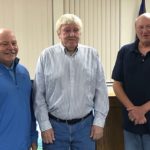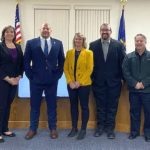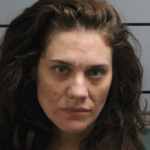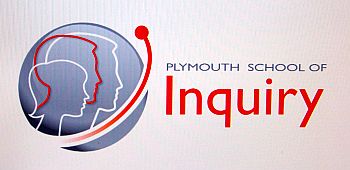 07/18/13 It’s hard to imagine increasing the enrollment of your school by 100 percent, but the Weidner School of Inquiry (WSOI) Co-directors Michael Delp and Jennifer Felke are up for the challenge. Both Delp and Felke taught in the first year of the Weidner School and were named co-directors for the 2013-2014 school year at the June meeting of the Plymouth School Board. The first year of the program was lead by Kenneth Olson as the sole director. Olson has returned to his former position as Dean of Student at PHS.
07/18/13 It’s hard to imagine increasing the enrollment of your school by 100 percent, but the Weidner School of Inquiry (WSOI) Co-directors Michael Delp and Jennifer Felke are up for the challenge. Both Delp and Felke taught in the first year of the Weidner School and were named co-directors for the 2013-2014 school year at the June meeting of the Plymouth School Board. The first year of the program was lead by Kenneth Olson as the sole director. Olson has returned to his former position as Dean of Student at PHS.
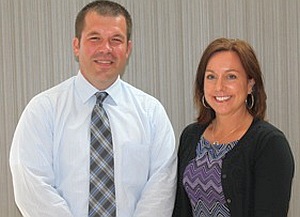 However, Felke and Delp feel collaborating as directors has its advantages. They said, “We believe the strength of this type of shared leadership is the fact the together we are more that the sum of our parts and we share the same commitment to student learning and achievement.” “We each bring our own unique strengths to our leadership team and we also have complimentary skills and a unified sense of purpose. Our working relationship is rooted in trust, respect and a mutual appreciation of our difference.” they said.
However, Felke and Delp feel collaborating as directors has its advantages. They said, “We believe the strength of this type of shared leadership is the fact the together we are more that the sum of our parts and we share the same commitment to student learning and achievement.” “We each bring our own unique strengths to our leadership team and we also have complimentary skills and a unified sense of purpose. Our working relationship is rooted in trust, respect and a mutual appreciation of our difference.” they said.
Actually the rise in enrollment came as no surprise. Plans were made at the initiation of the school to add 100 new freshman each year until the total enrollment reaches 400.
The Weidner School is a small learning community housed within Plymouth High School. The purpose for the community is clear. Felke and Delp said, “Our strategies combine Project Based Learning (PBL) as the instructional vehicle with a holistic approach to educating the whole child while promoting ownership of their learning experience and school environment.”
Each of the co-directors brings different backgrounds to the job. Felke previously taught at Oregon-Davis Jr/Sr High School where she was a founding teacher and also the site’s New Tech Advocate. She is a certified New Tech teacher and a certified National School Reform Faculty CFG Coach. During the 2012-2013 school year, she was the Director of Professional Development for the Weidner School of Inquiry.
Delp has coached the PHS boy’s tennis team since 1999. Additionally, he coached both boys basketball and golf. He has served as the Director of the Summer Tennis Program since 2000. While teaching at PHS, he lead several initiatives including Flip Instruction.
Delp is a graduate of Taylor University where he earned a BS in Education with a concentration in Mathematics and a junior high endorsement. He will compete is MA in November from Indiana Wesleyan University.
Felke holds a BA in Economics from DePauw University, CTE vocational License from Indiana State University and a MA in Education from Bethel College.
Both Delp and Felke will be completing their administrative licensees beginning in January from Indiana Wesleyan University.
The newly named directors realize there may be changes to address when school starts in mid-August. . They said, “We are anticipating that there will be some challenges with the two different levels of understanding of what the PBL process look like.” Plans are to utilize the current sophomore class in the mentoring and educating of the freshman coming into the environment. “Adding more students will mean we must be intentional in continuing to promote student ownership and choice in all aspects of WSOI. Being cognizant of developing and sustaining a strong student culture is an important part of the process of a New Tech school.” they said.
The newly renovated space has six double classrooms at this point. In November, three more classrooms will be added. The space is approximately 5000 square feet.
Although the classrooms and presentation space utilize modern technology, Delp and Felke say lessons are not necessarily based on the use of technology and computers. “New Tech is basically a brand name. Project Based Learning is an institutional method that could be and has been utilized without any form of technology.” they said.
Planning by the teachers and student in the WSOI takes dedication, according to the directors. “A full-scale project that lasts approximately three weeks usually takes a minimum of 40hours from the very beginning brainstorming session to the final revision of feedback through their Critical Friends Group” they said.
Teachers involved in WSOI had to apply for a position and also had to be chosen after an interview. Several of the teachers still teach some courses in the traditional high school. Teachers include Felke, Delp, Charlotte Tyree, Grant Masson, Lisa Mercer, Phil Koops, Haley Church, Earl Boyer, Jeff Corso, John Koziovich, Jacob Riley, and John Johnson.
Courses offered for the upcoming school year include Leadership Institute, Global Perspectives, and Bio Art, Math (Algebra I, Geometry or Algebra II) for incoming freshman. Sophomores will be offered American Perspectives, Food Science, and Math (Geometry, Algebra II, or Pre-Calculus / Trigonometry. Students may also avail themselves of passport courses at PHS.
WSOI students will receive the same graduation diploma as students at PHS. They are required to complete the same graduation requirements, including passing the ECA (End of Course Assessments). Students can choose from year to year to stay in the Weidner School for the following year or choose to transfer back to the traditional PHS learning environment. Both discipline and attendance problems, should they arise, are handled under the guidelines in the PHS handbook and handled by the administrators of PHS. However, both Felke and Delp feel the structure of the WSOI will keep students on track. They said, “A foundational piece of WSOI is the student culture that is intentionally developed though relationships, encouraging student to develop a growth mindset, and encouraging trust, respect and responsibility through all the student’s actions. We believe these efforts can reduce any discipline or attendance problems.”
To assure that students are on track, the teachers and directors of the WSOI use assessment tools including College Readiness Assessments and Literacy Tasks that are individual assessments. “Twice per year, students will be assessed on their trajectory toward college readiness in each core subject (English/Language Arts, social studies, math, and science) through a College Ready Assessment (CRA). Although students collaborate in teams, students complete individual assignments that allow facilitators to assess their mastery of not only state standards but 21st century skills and attributes as well, “said Felke and Delp.
The future of PBL and New Tech environments look good. “As we continue to transition to a fast changing world, skills and attributes that are developed though this instructional strategy will be necessary to thrive in a future career.” they said.
Delp and Felke are attending the New Tech annual conference in New Orleans. topics include: PBL Project Design, PBL Assessment, budding Culture in your Classroom, Building culture in your staff, Bringing the community into the classroom, Digital Learning, Building bridges with service learning, and content specific sessions for math, social studies, science, English, and electives.
“Empowering students is an ultimate goal of PBL.” said the new co-directors as they look to the future.
Carol Anders Correspondent











